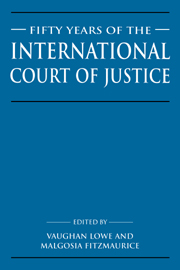Book contents
- Frontmatter
- Contents
- List of contributors
- Preface
- List of abbreviations
- Sir Robert Yewdall Jennings, by Vaughan Lowe
- List of publications of Sir Robert Jennings
- Table of cases
- Part I The International Court of Justice
- Part II The sources and evidences of international law
- Part III Substance of international law
- 10 The Court's role in relation to international organizations
- 11 Cases of the International Court of Justice relating to employment in international organizations
- 12 Jurisdiction and immunities
- 13 Adjudication as a mode of acquisition of territory?
- 14 Equitable maritime boundary delimitation
- 15 Environmental protection and the International Court of Justice
- 16 The contribution of the International Court of Justice to air law
- 17 The treatment of human rights and of aliens in the International Court of Justice
- 18 The International Court of Justice and the right of peoples to self-determination
- 19 The International Court of Justice and the peaceful settlement of disputes
- 20 The International Court of Justice and the use of force
- Part IV Procedural aspects of the work of the International Court of Justice
- Part V The International Court of Justice and the United Nations
- Index
19 - The International Court of Justice and the peaceful settlement of disputes
Published online by Cambridge University Press: 02 November 2009
- Frontmatter
- Contents
- List of contributors
- Preface
- List of abbreviations
- Sir Robert Yewdall Jennings, by Vaughan Lowe
- List of publications of Sir Robert Jennings
- Table of cases
- Part I The International Court of Justice
- Part II The sources and evidences of international law
- Part III Substance of international law
- 10 The Court's role in relation to international organizations
- 11 Cases of the International Court of Justice relating to employment in international organizations
- 12 Jurisdiction and immunities
- 13 Adjudication as a mode of acquisition of territory?
- 14 Equitable maritime boundary delimitation
- 15 Environmental protection and the International Court of Justice
- 16 The contribution of the International Court of Justice to air law
- 17 The treatment of human rights and of aliens in the International Court of Justice
- 18 The International Court of Justice and the right of peoples to self-determination
- 19 The International Court of Justice and the peaceful settlement of disputes
- 20 The International Court of Justice and the use of force
- Part IV Procedural aspects of the work of the International Court of Justice
- Part V The International Court of Justice and the United Nations
- Index
Summary
It may seem rather odd for anyone to be writing a chapter on the subject of the International Court of Justice and the pacific settlement of international disputes, since the pacific settlement of disputes is the function of the Court, like any other court. However, a discussion entitled thus need not be without point; there have been many attempts to assess the contribution of the Court to the settlement of disputes. But this kind of approach suffers from several shortcomings. It can lead to one simply cataloguing the disputes that have come before it, saying whether the Court's judgment or opinion did settle or assist in settling those disputes. Or it may consist also in a consideration of the importance of the disputes in question from the point of view of world peace, or of the development of international law.
Sometimes this kind of enterprise leads to conclusions such as that the Court has settled relatively few disputes, or that the disputes it has been called upon to settle have been on the whole relatively trivial when set against the background of the state of the world. These conclusions are then used to assert that the Court has too little to do and that it should be given more work.
- Type
- Chapter
- Information
- Fifty Years of the International Court of JusticeEssays in Honour of Sir Robert Jennings, pp. 364 - 372Publisher: Cambridge University PressPrint publication year: 1996
- 4
- Cited by



